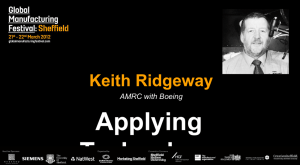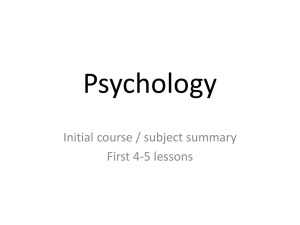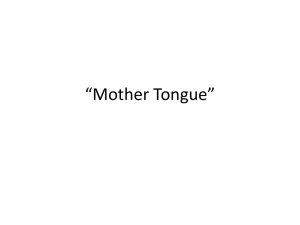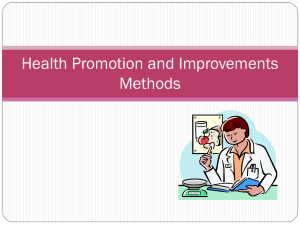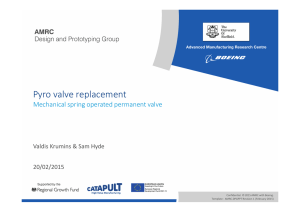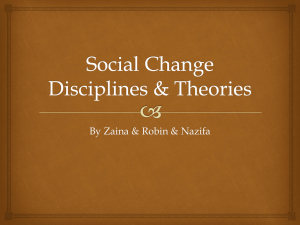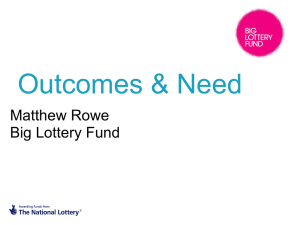year 10 GCSE Psych Intro powerpoint
advertisement
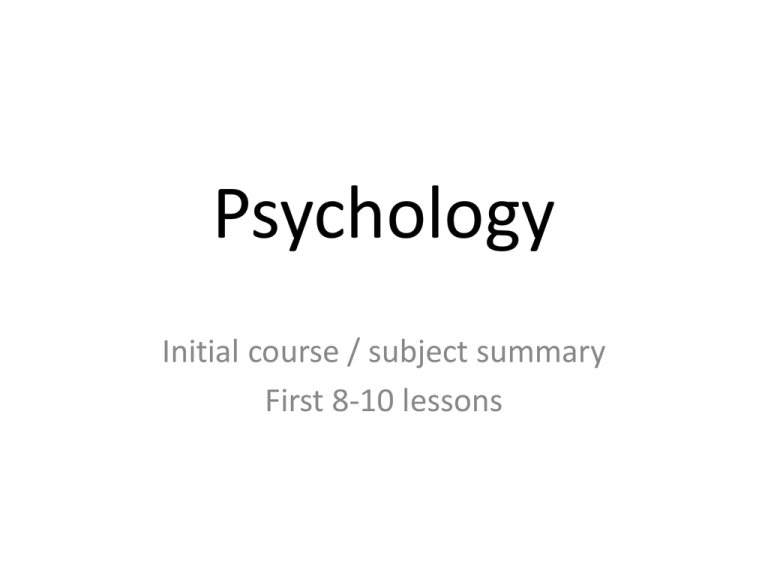
Psychology Initial course / subject summary First 8-10 lessons In this presentation • • • • Don’t be quiet – ask if needed Take notes in your own format Work quickly Answer if asked directly; volunteer answers if the question is open • Challenge & criticise one another – reasonably • Be focused on the material at all times Will we always work like this? Definition • Ψ is the science of – Mind – Brain – Behaviour • What’s the difference? • Take notes from the discussion if you like Sciences and social sciences • • • • • • • • Particles Atoms Molecules Cells Organisms People Groups Societies Which end is which? Where does Ψ go? Where other subjects? What is Ψ adjacent to? What do you want to know? • Write down any three questions to you want to know about mind, brain and behaviour. • Can the class provide an answer? • As a class, select one question we think we know the answer to, one question we might know part of the answer to, and one we don’t How would we TEST these presumptions? • Come up with a plan in small groups • Critique one another’s plans This is called “thought experiments” – we’ll get to do real experiments IF you can design your research well enough in theory first Top 5 reasons not to choose Ψ • “I would like to read people’s minds.” • “I want to fix my own issues. Argh.” • “I want to be a therapist and tell everyone it’s their mother’s fault.” • “I saw Battlestar Galactica. Am I a Cylon?” • “I suck at everything else. This must be easier.” Good reasons to choose Ψ • Very high employment rate for graduates • Good science complement for arts / humanities; good social science for sciences • “In the middle” study = can go in any direction • Modern subject so more tied in to modern life • More people choose it for the wrong reasons – Why is this good, if you’re not one of them? So why did you choose it? Timings • 6 weeks per unit (quicker on Unit 5) • = 1.5 weeks per topic (c 4 textbook pages) – 2 mini-exams per unit (every two topics, combined) – on theory, AMRC papers – you peer-mark and report these • but we also need practical time! The real learning is the practical stuff. Concentrate on consolidating textbook content yourself at home. AMRC? Theoretical (“what they THOUGHT”) Practical (“what they DID”) Experimenter creates: Aims Method Participant creates: Conclusion Results Aims: I decide what I’m trying to find out about Method: I decide a way to investigate it, and run the experiment / observation Results: what happens as a result of the experiment / what data is observed Conclusion: what does this prove about my original question / idea? You must have • a testable HYPOTHESIS • ethical standards (what are these?) Some example aims • To prove short-term memory has limited capacity • To prove long-term memory has unlimited duration • To prove children understand other people’s feelings • To test people’s reactions to provocation • To research the range of attitudes to bulimia • To measure the effect of stress hormones on feelings of self-esteem • etc Try your own AMRC again In groups of 3-4, pick another thing you’d like to find out about. • Write an AIM to investigate. How will you find out about / prove this so that others believed you? • Write a METHOD for an expt. This is very difficult and will take time and repeated effort and refinement. Be precise. Stick with it. Test your procedures • With your AIM, your teacher will either have – approved it – told you to change it – let you continue but said there will be problems! • Now defend your METHODS to class – another group will choose who speaks for you – class: point out failures in their design – your other members can redesign as you go Lessons from designing expts • Refining an AIM is difficult; must be PRECISE • Methods are often COMPLEX! • Criticism should be easy... RANGE of criticism requires more imagination and intelligence • Group design is necessary to spot fault • Seek to criticise real studies’ designs • Design = poor expt = worthless Methodological / ethical Methodological problems = “did the study actually do what it says it did?” (we just did this) Ethical problems = “should the study have been done this way?” (NB subjects / participants) M probs are always present. E probs are mostly historical – we’re much more limited now than we used to be. What would be unacceptable in a Ψ experiment? Technical glossaries • Note bold items in the book • Make your own “Key words” boxes in notes as you go – they must stand out at a glance • Definitions CANNOT be inexact – they must be spot-on (or it’s grade U for you) Optional research task: breadth • On your phones (or other) research names of famous psychologists, or movements in psychology • Allocate who will research what in a group of 3-5 • Decide what types of information you need (beware open-ended research) Your teacher could let you “marketplace” this or use some other active learning tool to share it. Review What is Psychology? Is it a science? What are the areas of study? Where will it take you in life? What is AMRC? Will our study include practical? What will my notes include? What are ethics? Overview-of-Ψ exercises • Remember: mind, brain and behaviour • Read the following real-world problems • Seek to explain each in terms of only TWO of the above words • You will work alone at first, trying a full written answer (min ½ page of A4 each problem) • Share ideas in groups; produce joint mindmap • Now improve your full written answer “A young man is depressed. One professional advises he takes a low dosage of a medication – called an SSRI – and says this alone will make him happier. Another professional advises he keeps a diary of his feelings, reviews them at meetings with the professional. Both are recognised treatments. What idea underlies the methods of treatment?” “A high jumper facing a challenge tries to talk herself up to it. She has never beaten this competitor, and would need to beat her personal best to do so this time. She stands at the start of the runway literally talking to herself, aloud. Why is she doing this? What is going on?” “You remember the moment you nearly died in a car crash when you were younger. A car hit your parents’ car at speed. You have a ‘flashbulb memory’ of seeing it coming in the last second through the side window. More happily, you also vividly remember your fifth birthday. Yet you can’t remember which day you have your PE kit, or when homework is due. What is going on with your memory?” “A young person has an eating disorder. They know their BMI says they’re underweight, and they know others are concerned. They avoid talking about it. They still feel they themselves are fat. They avoid eating wherever possible. Is this a mind, brain or behaviour problem?” Initial test All that we’ve talked about relates to the syllabus but is not directly from any unit. The aim has been to give you an overview of Ψ. You’re being asked to review the experience. Now, in pairs, go back over your notes. Write a test (with a mark scheme!) for the class. The best test can be used by the whole class. Independent learning task (Pair) Create a brochure+display combo detailing as fully as possible the nature of the subject for younger students considering taking the subject. Use this PP as a prompt, and research further. Bluff to sound more knowledgeable than you are – but outright wrong = FAIL. Let the tests guide you. Use clear sections. Create effective, attractive presentation for wall display. COMPETE. WIN.
